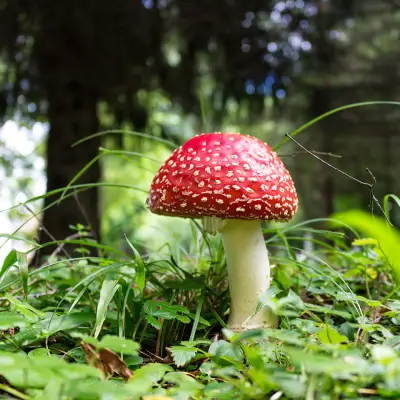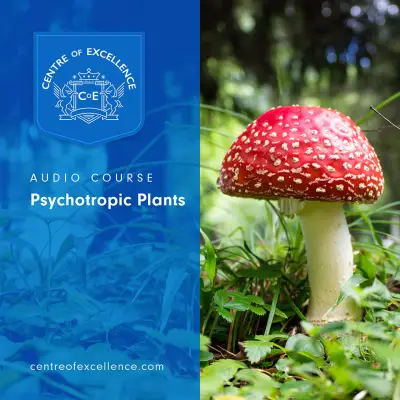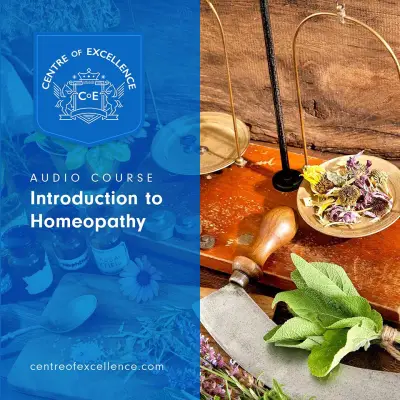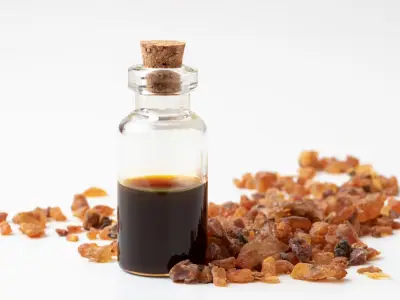If you're reading this, perhaps you're curious about adaptogens, or you’ve come across a herbal supplement with an unusual name: Schisandra. This fascinating berry, known as Schisandra chinensis, is often praised in traditional medicine and modern herbalism for its wide-ranging benefits. But what exactly does it do, and how do you use it safely? Let’s explore the uses, benefits, and side effects of schisandra berry.
This article is for informational purposes only and is not a substitute for professional medical advice, diagnosis, or treatment. Always consult with your GP or a qualified healthcare professional before starting any new herbal remedies, especially if you are pregnant, breastfeeding, taking medication, or managing a health condition.
Jump to:
- What is Schisandra Berry?
- The Benefits of Schisandra Berry
- What Types of Schisandra Berry Can You Take?
- What is the Best Form of Schisandra Berry to Take?
- How Much Schisandra Berry Should You Take, and When?
- What Are the Side Effects of Schisandra Berry?
- Who Should Avoid Schisandra Berry?
- Is Schisandra Berry Safe for Long-Term Use?
- Other Common Questions About Schisandra Berry
- Study Our Master Herbalist Diploma for £29
Recommended for you!
Best SellersWhat is Schisandra Berry?
Schisandra berry comes from the Schisandra chinensis plant, a woody vine native to northern China and parts of Russia. It's sometimes referred to as the “five flavour berry” because it contains all five basic flavours recognised in traditional Chinese medicine: sweet, sour, salty, bitter, and pungent. This unusual combination is part of what makes the berry so unique and powerful.
Often used in herbal remedies, the schisandra herb is classified as an adaptogen, meaning it’s believed to help the body adapt to stress, both physically and mentally. Traditionally, schisandra has been used to support liver health, increase energy, and promote mental clarity.
The Benefits of Schisandra Berry

Schisandra berry has gained attention for its wide-ranging effects on both physical and emotional health. From supporting hormonal balance to enhancing liver function, this versatile berry offers a natural way to boost overall wellbeing.
Schisandra’s Benefits for Women
For many women, schisandra offers support for hormonal health and energy levels. Though it doesn’t contain hormones, it’s believed to influence the endocrine system by helping the body regulate oestrogen and cortisol in a balanced way. This makes it a popular choice for those experiencing symptoms related to hormonal changes, such as menopause.
Women have reported improvements in mood, reduced hot flashes, and better stress resilience, alongside enhanced reproductive wellness.
Brain and Mood Support
Schisandra is often praised for its ability to support mental clarity and emotional wellbeing. As an adaptogen, it helps regulate the body’s stress response, which may lead to greater calm, sharper focus, and improved resilience in demanding situations.
Regular use has been associated with increased mental alertness and a more stable mood, which is why it’s sometimes called a “brain tonic” in traditional herbalism.
Liver Health and Detoxification
For those looking to support their liver, schisandra offers a natural, time-honoured solution. It has long been used in traditional medicine to protect the liver and encourage detoxification, with some modern studies suggesting it may help manage conditions like fatty liver disease.
The berry’s high antioxidant content contributes to its ability to assist the body in clearing toxins and maintaining healthy liver function.
Skin, Hair, and Ageing
The health of your skin and hair is often a reflection of internal balance, and schisandra may offer subtle support in this area. Its antioxidant and anti-inflammatory compounds may help to slow visible signs of ageing, reduce skin irritation, and promote a clearer complexion.
While research on its effects on hair growth is still emerging, its role in enhancing blood flow and hormonal harmony could encourage stronger, healthier hair over time.
Sleep, Energy, and Physical Endurance
Schisandra supports the nervous system in a way that helps balance energy and rest. While it doesn’t act as a sedative, it can help regulate the body’s internal rhythms, potentially improving sleep quality without causing drowsiness.
Many people find it boosts stamina, endurance, and mental energy during the day. Depending on individual response, it may be most helpful either in the morning for an energising lift or in the evening for calming the mind.
Weight Management and Appetite
By supporting metabolic processes and stress regulation, schisandra may offer gentle assistance in managing weight. Its influence on blood sugar balance and cortisol levels may help reduce emotional eating and improve the body’s ability to process energy efficiently.
Some people also find that it helps naturally suppress the appetite, making it easier to maintain healthy eating habits.
Schisandra and Inflammation
Supporting the body’s response to inflammation is another potential benefit of schisandra. The berry contains plant compounds known as lignans, which are believed to help reduce inflammation and oxidative stress. This may be particularly beneficial for people with inflammatory conditions or those looking to support long-term health and vitality.
What Types of Schisandra Berry Can You Take?
Schisandra supplements come in a variety of forms, allowing you to choose the best option based on your health goals and daily habits.
You’ll find it available as powders, capsules, tinctures, teas, dried berries, and combination formulas. Some forms are better suited to long-term stress support, while others are ideal for quick absorption or more traditional herbal practices.
What is the Best Form of Schisandra Berry to Take?
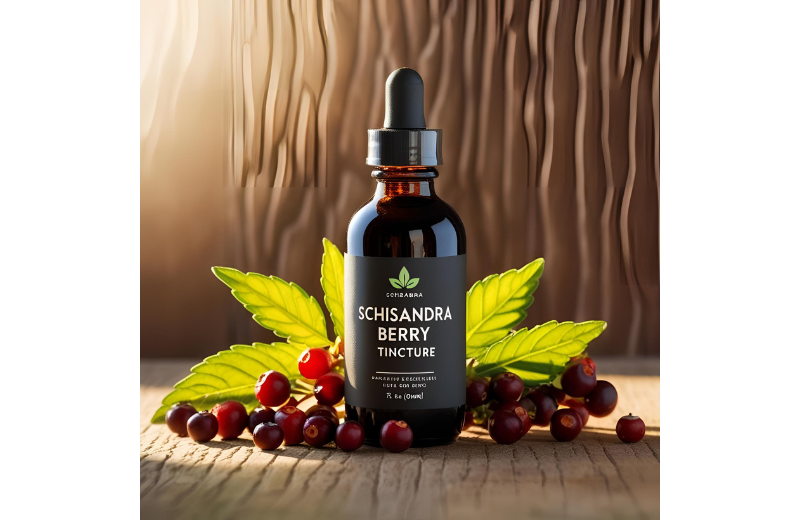
- Powders: Schisandra powder is a versatile option that can be mixed into smoothies, herbal drinks, or sprinkled over food. It allows for customisable dosing and is a popular choice for those following traditional herbal practices.
- Capsules: Capsules are a practical and straightforward way to take schisandra, especially for consistent daily use. They offer pre-measured doses, are easy to carry, and require no preparation. This form is excellent for those who prefer convenience without the taste of the herb.
- Tinctures: Tinctures are concentrated liquid extracts, often taken under the tongue or added to water. They provide quick absorption and are ideal for those looking for fast-acting, potent support. Tinctures are often preferred by experienced herbal users and can be adjusted in small increments to suit individual needs. Discover how to make your own Herbal Tinctures.
- Teas: Schisandra tea offers a warming and grounding way to enjoy the benefits of the herb. It’s often combined with other adaptogens or calming herbs to support relaxation and energy balance. This form is perfect for those who appreciate ritual and enjoy the flavour of schisandra berries.
- Dried Berries: Whole dried schisandra berries can be used in traditional decoctions or added to homemade herbal blends. They are a good choice if you prefer to prepare your own remedies and enjoy a hands-on approach to herbal wellness. This form retains the full profile of the berry, including its distinctive five-flavour character.
- Combination Formulas: Some schisandra products include additional adaptogens or nutrients like ashwagandha, rhodiola, or B vitamins. These blends are created to support multiple areas of health such as stress, fatigue, and cognitive function.
Whatever form you choose, it’s best to look for high-quality supplements made from schisandra chinensis, the species most commonly used in traditional medicine. Choose trusted brands that use careful extraction and drying methods to preserve the potency and benefits of the schisandra herb.
How Much Schisandra Berry Should You Take, and When?
Typical daily dosages of schisandra range from 500 mg to 2,000 mg, depending on the form, strength, and purpose of use. Lower amounts are often used for ongoing support with stress, energy, and hormonal balance, while higher doses may be used short-term during periods of high demand or fatigue.
If you're new to schisandra, it’s wise to start with a lower dose and gradually increase it as your body adjusts. Capsules and tinctures provide clear dosing, while powders and teas allow for more flexibility.
Many people choose to take schisandra in the morning or early afternoon to support daytime energy, focus, and stress management. However, others find it helpful in the evening, particularly if they’re looking for nervous system balance or improved sleep quality.
For best results, schisandra can be taken daily, especially during times of stress, seasonal changes, or hormonal fluctuations.
What Are the Side Effects of Schisandra Berry?

Schisandra is generally well tolerated when taken in recommended amounts, but like any supplement, it can cause side effects in some people, particularly if taken in high doses or without appropriate guidance. Common side effects may include:
- Digestive discomfort, such as heartburn, stomach cramps, or nausea
- Headaches or light-headedness
- Sleep disturbances
- Skin reactions or itching (rare)
These effects are usually mild and temporary. However, it’s important to monitor your response when starting schisandra and adjust the dosage if needed. To reduce the chance of side effects, start with a low dose and gradually increase as your body adapts.
Who Should Avoid Schisandra Berry?
While schisandra offers many health benefits, it’s not suitable for everyone. Those with epilepsy should avoid using schisandra, as it may stimulate the nervous system and potentially increase the risk of seizures. People taking medications that affect the liver, blood pressure, or hormone levels should consult a healthcare provider before adding schisandra to their routine, as interactions are possible.
Pregnant and breastfeeding women are advised to avoid schisandra unless under the supervision of a qualified practitioner, as there is limited safety data for these groups. It’s also best for children to avoid schisandra supplements unless specifically recommended by a healthcare professional.
Is Schisandra Berry Safe for Long-Term Use?
For most healthy adults, schisandra is considered safe for ongoing use when taken at appropriate dosages. In traditional herbalism, it has been used over extended periods to support vitality, stress resilience, and hormonal balance.
However, because every body is different, long-term use is best approached with balance. Many herbalists recommend taking schisandra in cycles, such as during times of high stress or seasonal transitions, rather than continuously year-round.
Recommended for you!
Best SellersOther Common Questions About Schisandra Berry
Does schisandra raise blood pressure?
Schisandra is not known to raise blood pressure in healthy people. However, if you have high blood pressure or are taking antihypertensive medication, it’s wise to monitor your levels and speak to a healthcare provider before use.
Does schisandra raise cortisol?
Rather than raising cortisol, schisandra helps the body regulate it more efficiently. This makes it particularly useful during periods of chronic stress or burnout, when cortisol levels may be imbalanced.
Is schisandra good for anxiety?
Many users report that schisandra has a calming effect on the nervous system, making it a useful natural tool for managing day-to-day stress and mild anxiety. While not a replacement for professional treatment, it may offer gentle support for emotional balance and clarity.
Does schisandra increase oestrogen?
Schisandra doesn’t contain oestrogen, but it may support healthy oestrogen metabolism and balance through its influence on the endocrine system. This is one reason why it’s often recommended for women experiencing hormonal shifts, such as those during menopause.
Is schisandra warming or cooling?
In traditional Chinese medicine, schisandra is considered a warming herb. This quality makes it beneficial for people who tend to feel cold, fatigued, or energetically low.
How does schisandra make you feel?
Most people describe feeling a calm sense of alertness, mental clarity, and gentle invigoration after taking schisandra. It’s not overly stimulating but can enhance focus and stamina throughout the day.
What are the spiritual benefits of schisandra?
Some people believe schisandra enhances mental clarity, deepens focus, and strengthens the connection between mind and body. This has made it popular in meditation practices and energy work, where mental and emotional presence are key.
Can schisandra help with fatigue?
Schisandra is often used to support natural energy levels and combat physical and mental fatigue. It does this by helping the body adapt to stress and maintain balanced energy throughout the day without causing overstimulation.
Is schisandra good for the thyroid?
Schisandra may offer indirect support for thyroid health by reducing stress and supporting liver function, both of which play roles in hormone regulation. However, it is not a thyroid medication and should be used as a supportive herb, not a primary treatment.
Does schisandra interact with medications?
Schisandra may interact with medications that are metabolised by the liver, as it can affect liver enzyme activity. If you’re taking prescription drugs, especially those related to the liver, hormones, or blood pressure, it’s important to consult your GP or pharmacist before using schisandra.
Does schisandra suppress appetite?
Some people find that schisandra reduces cravings and helps manage appetite, especially when stress eating is a factor. This effect is likely due to its ability to support emotional balance and stabilise blood sugar levels.
Study Our Master Herbalist Diploma for £29
If you’ve found yourself fascinated by the potential of schisandra berry and other natural remedies, why not deepen your understanding? Whether you're a beginner or looking to expand your knowledge, Centre of Excellence offers a comprehensive Master Herbalist Diploma Course, designed for people of all levels.
The course covers everything from herb identification and preparation to building herbal blends for specific emotional and physical needs. Follow the link to access the course for just £29!

